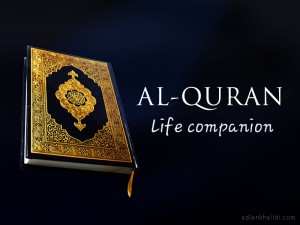By Amer Haleem

One of the blessings of the Qur’an as divine revelation is that it gives us the “lines” that guide our life.
One of the handiest blessings of the Qur’an as divine revelation is that it sets out clearly for us the character “types” and roles that people cast themselves as and in, in life. Then it gives us—and at the precise script prompts—the “lines” they inevitably deliver from the scenes they have chosen to act in.
In my early experience with the Qur’an, I could not readily discern this connection. I would read the Qur’an’s commands, “Say,” or “Say to them,” and “they shall say,” and would miss the correspondence between the account of the Qur’an and the scripted responses of contemporaries playing out their roles. My ear, rather my heart, wasn’t yet properly tuned to the divine dialogue.
There are reasons for this common lack. The most important of them are sufficient immersion in the Arabic Qur’an as the Speech of Allah, and learning how to hear the Qur’an’s meaning unfiltered by the various catechisms to which all of us have been massively and incessantly exposed. This also relates to developing a proper sense of the Qur’an’s Arabic.
The first training of our senses requires a serious commitment of time. The Qur’an must be read and heard, read and heard, read and heard on a consistent agenda and persistent basis that must be overriding. This should be undertaken each time with a mortal consciousness, by which I mean an imminent sense of life-and-death—namely, that one is being urgently instructed, and that this instruction is coming directly from the true and only God.
By “read,” I mean this to include both its internalized and externalized intellectual and mechanical means. One is illumination. The other is measured recital. In fact, this kind of reading is a necessary reflection of the sense of which I have just spoken. Allah states:
Those to whom We have given the [Qur’an as a revealed] Book—who recite it with its due recitation—it is these who truly believe in it. And whoever disbelieves in it, then it is such as these who are the losers. (Al-Baqarah 2:121)
In other words, belief in the Qur’an, that it comes from the sole Creator through a chosen, final human Messenger, dictates that we will read it this way. Then, it will open—and become—our senses. And we will be able to see, hear, taste, smell, and feel through it.
This is all I wanted to say.
But let me give you an example of my meaning. Recall the Qur’an’s famed account in Surat Al-Kahf of the two men, one of whom God had granted great wealth in the form of two plentiful gardens and numerous children (18:32-44). He enters his fruit-laden, river-watered gardens with his impoverished friend, and at that moment his soul is overcome by his tremendous fortune and the centrality and power which this opulence has given him in relation to a huge retinue around him.
His sense of personal fortune and authority cause him to doubt the existence of God. In any case, God’s existence seems irrelevant to him because of the riches and dominion he thinks he is the cause of and sovereign over. It is all about him, isn’t it?
Thus, of his own will, he casts himself into an available character and faithfully utters his lines in this, his chosen script of life:
So he said to his friend while he was conversing with him: I am greater than you in wealth and mightier in kinsmen. … I do not think that this flourishing garden will ever perish. Nor do I think the Hour of Doom will ever come. Yet even if I am to be returned to my Lord, most surely, I shall find far better than this as my destiny. (Al-Kahf 18:34)
You know his outcome (and if not, you know where to find it). But these character types and scripts remain all around us, if we can hear.
Recently, former New York City mayor Michael Bloomberg, the business media mogul whose $33 billion net worth makes him the eleventh richest person in America and sixteenth in the world, expressed uncertainty that God exists, but had this to say about his destiny on the Day of Judgment and in the Afterlife:
“I am telling you, if there is a God, when I get to heaven I’m not stopping to be interviewed. I’m heading straight in. I have earned my place in Heaven.”
Can you not hear it now, the very lines of the character-type the Qur’an has set forth for us. If only Mr. Bloomberg could.
_______________________________
Source: Taken with modifications from Al-Jumuah Magazine.

